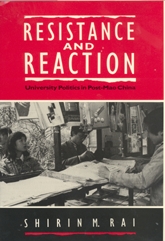Resistance and Reaction
Resistance and Reaction: University Politics in Post-Mao China
1991, Harvester-Wheatsheaf, Hemel Hempstead; pp. 229+xvii, ISBN 0-7450-0903-4
|
Synopsis |
| A study of the reform policies in the sphere of higher education in post-Mao China, this work examines the concrete conditions in Chinese universities which gave rise to much social instability within the education system, which was then cast on to the national political scene. It focuses upon the nature of the educational reforms, their impact on the lives of various interests within the universities in China, and the different opportunities that these interests had of articulating their demands, anxieties and fears. It seeks to understand the necessity for, as well as the nature and progress of the reforms in higher education. The book addresses two issues. First, the nature of the pressures and interests arising out of the structure and functioning of higher education in China and post-Mao reforms. Second, the ways in which these pressures and interests have been allowed to be aired in the political system, and with what results. It is thus a study of the levels of participation allowed to different sections of the university population by the authorities. It explores the realm of non-authorized participation by those denied access to the public sphere within and outside the university. While unpacking the process of policy implementation in China, it also studies strategies of overt and covert subversion, tactics of resistance through non-action, and of open opposition by those affected by the reform policy. It points to the political consequences of the failure of institutions and organizations when they are unable or incapable of representing the interests of their membership. It is, in short, a story of a process of recognition of special interests and a demand for a system that will allow for their articulation. |

